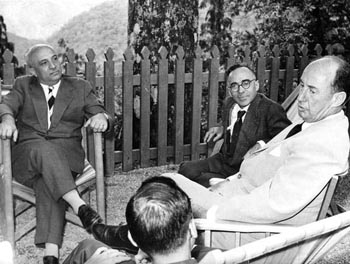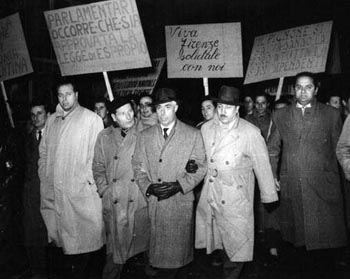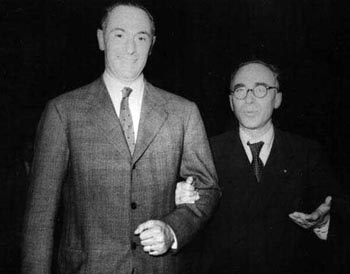Socio-Political Issues
 |
 |
 |
 |
 |
 |
 |
La Pira: A Catholic Communist - Part VII
The Draconian Socialist Activity of the
‘Humble’ La Pira
In the previous article, we saw how the upper echelons of post-war Italian politics were infiltrated by placemen, mostly disciples of Msgr. Montini’s Catholic Action program. They had secretly conspired in the Monastery of Camaldoli to achieve the ideal communist society of state ownership of property and universal compulsory labor (a.k.a. “full employment”).
 Before he became Mayor of Florence, Giorgio La Pira worked as Undersecretary of Labor in the Ministry of Employment and Social Insurance, which was headed by his friend Amintore Fanfani. Like his fellow Camaldolians, Fanfani had an aversion to a free market economy and believed that the State should provide jobs for everyone, that it should have exclusive control of the most important businesses, and that it should take legal sanctions against private entrepreneurs to prevent them from becoming too rich.
Before he became Mayor of Florence, Giorgio La Pira worked as Undersecretary of Labor in the Ministry of Employment and Social Insurance, which was headed by his friend Amintore Fanfani. Like his fellow Camaldolians, Fanfani had an aversion to a free market economy and believed that the State should provide jobs for everyone, that it should have exclusive control of the most important businesses, and that it should take legal sanctions against private entrepreneurs to prevent them from becoming too rich.
It was obvious that private enterprise would not be respected in a country where successive Prime Ministers, holders of key Cabinet positions, had been through the Montini mill. In the words of La Pira himself: “You must change everything in Italy, introduce a planned economy and radically change the country’s political personnel.” (1)
The path to tyranny
Few people realized at the time – and fewer are aware even now – that the Montini circle constituted a well-developed network which had become so integrated with the political institutions of the country that it could make a concerted attack against private owners of the means of production.
That explains how the “holy mayor” La Pira got away with behaving like a typical Marxist autocrat by presiding over the attempted Stalinization of Florence while enjoying all the impunity that a corrupt state apparatus and a manipulated political system could provide. We shall see how he conducted a bullying campaign against private entrepreneurs, seizing their businesses, requisitioning their homes, withdrawing their passports, and denouncing them to the Pope for allegedly oppressing the poor.
It is, of course, deeply shocking to see a supposedly Catholic government conniving at the social attitudes of its political opponents, the communists, and even adopting some of their tactics. But this paradox is lost on the Catholic Left in general.
Political cronyism in action
The tightness of the grip exerted by Montini’s men on Italian society can be illustrated by La Pira’s involvement in the “Pignone case.” His supporters call it the pièce de résistance of his career “with which La Pira forever linked his name” (see here). In reality it was for his everlasting shame.
 Pignone was an industrial plant in Florence that had flourished during the war but experienced financial difficulties due to a slump in demand for its products. When the president of the firm that owned Pignone, Franco Marinotti, decided to lay off some of the workers in 1953, La Pira lost no time in backing a communist-led strike of the whole workforce.
Pignone was an industrial plant in Florence that had flourished during the war but experienced financial difficulties due to a slump in demand for its products. When the president of the firm that owned Pignone, Franco Marinotti, decided to lay off some of the workers in 1953, La Pira lost no time in backing a communist-led strike of the whole workforce.
We learn from a contemporary newspaper report that the strike leader, Franco Fantini, a worker at Pignone, was dismissed for having participated in a Communist Party meeting. The object of the strike was to deprive private owners of their means of production: A photo of the strike shows a banner bearing the words “The law of expropriation must be approved by Parliament” (see here).
La Pira found that acceptable and attended Mass with the workers in the occupied factory in defiance of Pope Pius XII’s recently issued decree against collaboration with communists. The Mass was said by the first worker-priest in Italy, Fr. Bruno Borghio, who claimed he had permission to do so from Card. Dalla Costa, Archbishop of Florence. (2)
According to his progressivist friend, Fr. Ernesto Balducci, La Pira wrote to all the Bishops in Italy, sending them a copy of his correspondence with Marinotti. (3) He even made a special plea to the Pope for his intervention in the strike.
It is of the greatest significance that the reply from the papal household came from the pen of “yours truly,” Msgr. Montini, assuring the workers of his “paternal interest” and rebuking the company owners for failing to assure the livelihood of the workers and their families. (4) The implication is that the workers were pawns in a “culture of victimization” and needed to be liberated from the unjust “oppression” of private entrepreneurs. This image is essentially that of the “class struggle” promoted by Karl Marx.
With the support of the Archbishop of Florence, Cardinal Dalla Costa and Msgr. Montini, La Pira felt justified in calling on his friend, Fanfani, who was then Minister of Internal Affairs, to intervene. The latter issued an order to the company to halt the layoffs and, in a gesture worthy of Stalin himself, sent the police to Marinotti’s house and withdrew his passport. (5)
Moral inversion: the glorification of shabby deeds
The whole sordid affair was recorded in the collected letters of La Pira and Fanfani taken from the archives of the Giorgio La Pira Foundation. We learn from a November 1953 letter from Fanfani to La Pira that the pair was jubilant over its success. The letter registered their satisfaction with the action taken against Marinotti: They regarded it as a fulfilment of the verse in the Magnificat that states: “He hath put down the mighty from their seat and exalted the humble.”
Fanfani went so far as to describe the Magnificat as “the true song of democracy.” (6) And La Pira crowed that the Pignone triumph was Matthew 25 transposed into modern times. (7)
A cynical government takeover
With no passport and a strike-bound factory, Marinotti had no option but to submit to the next round of injustice – the seizure of Pignone by Fanfani at La Pira’s request.
This was a clear case of corruption, for La Pira’s influence on Fanfani when the latter was Secretary of the Christian Democratic Party (1954 to 1959) was a fact known to many at the time.(8)
Political patronage
But the political sleaze gets worse: The person to whom Fanfani – again at La Pira’s request – handed over the Pignone Company was Enrico Mattei, a fellow conspirator who had participated at the Camaldoli Conference in 1943.
 Like Fanfani, he had been elected to the Chamber of Deputies in 1948 and had established a faction within the Christian Democrat Party. While in Parliament, Fanfani and Mattei pushed through a bill to establish the state-owned oil consortium, ENI, of which he became President. (9)
Like Fanfani, he had been elected to the Chamber of Deputies in 1948 and had established a faction within the Christian Democrat Party. While in Parliament, Fanfani and Mattei pushed through a bill to establish the state-owned oil consortium, ENI, of which he became President. (9)
A contemporary report noted: Mattei has become the symbol of a vigorous new State Socialism of the type which has long appealed to the logical Latin mind. He carries the banner for a large group, perhaps a majority, of Italians who think that by a judicious use of public monies some of the grave shortcomings of Capitalism can be corrected. (10)
Mattei used that state-owned company’s resources (and taxpayers’ money) to influence national policies in support of domestic and foreign operations and to finance political parties, including the socialists. (11) In fact, ENI became so powerful and exercised such a degree of autonomy that it was regarded as a “State within a State.” It is worth noting that, through the Pignone affair, little La Pira, “humble” and “poor,” had played a part in helping ENI to become a formidable instrument of political rule.
To be continued

Posted July 1, 2013

Fanfani, La Pira and Adlai Stevenson at Camaldoli Monastery planning for a Socialist Italy & Church
It was obvious that private enterprise would not be respected in a country where successive Prime Ministers, holders of key Cabinet positions, had been through the Montini mill. In the words of La Pira himself: “You must change everything in Italy, introduce a planned economy and radically change the country’s political personnel.” (1)
The path to tyranny
Few people realized at the time – and fewer are aware even now – that the Montini circle constituted a well-developed network which had become so integrated with the political institutions of the country that it could make a concerted attack against private owners of the means of production.
That explains how the “holy mayor” La Pira got away with behaving like a typical Marxist autocrat by presiding over the attempted Stalinization of Florence while enjoying all the impunity that a corrupt state apparatus and a manipulated political system could provide. We shall see how he conducted a bullying campaign against private entrepreneurs, seizing their businesses, requisitioning their homes, withdrawing their passports, and denouncing them to the Pope for allegedly oppressing the poor.
It is, of course, deeply shocking to see a supposedly Catholic government conniving at the social attitudes of its political opponents, the communists, and even adopting some of their tactics. But this paradox is lost on the Catholic Left in general.
Political cronyism in action
The tightness of the grip exerted by Montini’s men on Italian society can be illustrated by La Pira’s involvement in the “Pignone case.” His supporters call it the pièce de résistance of his career “with which La Pira forever linked his name” (see here). In reality it was for his everlasting shame.

La Pira stimulated strikes at Pignone industrial plant, here led by Mattei who headed the takeover
We learn from a contemporary newspaper report that the strike leader, Franco Fantini, a worker at Pignone, was dismissed for having participated in a Communist Party meeting. The object of the strike was to deprive private owners of their means of production: A photo of the strike shows a banner bearing the words “The law of expropriation must be approved by Parliament” (see here).
La Pira found that acceptable and attended Mass with the workers in the occupied factory in defiance of Pope Pius XII’s recently issued decree against collaboration with communists. The Mass was said by the first worker-priest in Italy, Fr. Bruno Borghio, who claimed he had permission to do so from Card. Dalla Costa, Archbishop of Florence. (2)
According to his progressivist friend, Fr. Ernesto Balducci, La Pira wrote to all the Bishops in Italy, sending them a copy of his correspondence with Marinotti. (3) He even made a special plea to the Pope for his intervention in the strike.
It is of the greatest significance that the reply from the papal household came from the pen of “yours truly,” Msgr. Montini, assuring the workers of his “paternal interest” and rebuking the company owners for failing to assure the livelihood of the workers and their families. (4) The implication is that the workers were pawns in a “culture of victimization” and needed to be liberated from the unjust “oppression” of private entrepreneurs. This image is essentially that of the “class struggle” promoted by Karl Marx.
With the support of the Archbishop of Florence, Cardinal Dalla Costa and Msgr. Montini, La Pira felt justified in calling on his friend, Fanfani, who was then Minister of Internal Affairs, to intervene. The latter issued an order to the company to halt the layoffs and, in a gesture worthy of Stalin himself, sent the police to Marinotti’s house and withdrew his passport. (5)
Moral inversion: the glorification of shabby deeds
The whole sordid affair was recorded in the collected letters of La Pira and Fanfani taken from the archives of the Giorgio La Pira Foundation. We learn from a November 1953 letter from Fanfani to La Pira that the pair was jubilant over its success. The letter registered their satisfaction with the action taken against Marinotti: They regarded it as a fulfilment of the verse in the Magnificat that states: “He hath put down the mighty from their seat and exalted the humble.”
Fanfani went so far as to describe the Magnificat as “the true song of democracy.” (6) And La Pira crowed that the Pignone triumph was Matthew 25 transposed into modern times. (7)
A cynical government takeover
With no passport and a strike-bound factory, Marinotti had no option but to submit to the next round of injustice – the seizure of Pignone by Fanfani at La Pira’s request.
This was a clear case of corruption, for La Pira’s influence on Fanfani when the latter was Secretary of the Christian Democratic Party (1954 to 1959) was a fact known to many at the time.(8)
Political patronage
But the political sleaze gets worse: The person to whom Fanfani – again at La Pira’s request – handed over the Pignone Company was Enrico Mattei, a fellow conspirator who had participated at the Camaldoli Conference in 1943.

Mattei & La Pira worked arm in arm for a State Socialism
A contemporary report noted: Mattei has become the symbol of a vigorous new State Socialism of the type which has long appealed to the logical Latin mind. He carries the banner for a large group, perhaps a majority, of Italians who think that by a judicious use of public monies some of the grave shortcomings of Capitalism can be corrected. (10)
Mattei used that state-owned company’s resources (and taxpayers’ money) to influence national policies in support of domestic and foreign operations and to finance political parties, including the socialists. (11) In fact, ENI became so powerful and exercised such a degree of autonomy that it was regarded as a “State within a State.” It is worth noting that, through the Pignone affair, little La Pira, “humble” and “poor,” had played a part in helping ENI to become a formidable instrument of political rule.
To be continued
- Catholic Herald, 2 September 1955 (See here);
- See Neera Fallaci, Dalla parte del'ultimo - Vita del prete Lorenzo Milani, Milano Libri Edizioni, 1974, pp. 300-301; see also here
- Fr. Ernesto Balducci, a Piarist priest, was a political activist in Florence. He made a career out of disobedience to his Bishop, Msgr. Florit, who made him leave Florence in 1963. He stayed until 1965 in Rome where he enjoyed the protection of Pope Montini. The latter used his influence to override the wishes of the Bishop of Florence and restore Fr. Balducci. Fr. Balducci produced a radical magazine, Testimonianze (Testimonies) that supported the reforms of Vatican II.
- “Proteger y defender el pan y el trabajo para tantos hogare” [To protect and guarantee bread and work for many homes]. Quoted in Fr. Ernesto Balducci, Giorgio La Pira, Acción Cultural Cristiana, Salamanca, 2002, pp. 45-46.
- Francesco Malgeri, La stagione del centrismo. Politica e società nell'Italia del secondo dopoguerra (1945-1960), Soveria Mannelli, 2002, p. 319. Fanfani authorized the Prefect of Florence (the government’s representative in the Provinces) to withdraw Marinotti’s passport.
- Fanfani wrote to La Pira: “Ti sono particolarmente grato di aver concluso con il ricordo del 'Magnificat.' Io ho sostenuto che esso è il vero canto della democrazia: disperse i superbi ed esaltò gli umili.” [I am especially grateful to you for remembering the Magnificat in your conclusion. I have sustained that it is the true hymn of democracy: to put down the mighty and exalt the humble.] Ettore Barnabei, in Sara Selmi e Sebastiano Nerozzi, Caro Giorgio, Caro Amintore: Carteggio 1951-1977, 25 anni di storia nel carteggio La Pira-Fanfani, Polistampa, 2003
- From a letter to Franco Marinotti quoted in Ernesto Balducci, op. cit., p. 45
- Giorgio Galli, La Sfida perduta: biografia politica di Enrico Mattei, Bompiani, Milan, 1976, p. 107
- Ente Nazionale Idrocarburi (National Hydrocarbons Agency)
- “Un buon sistema economico deve evitare l'arricchimento eccessivo che rechi danno a un'equa distribuzione; e in ogni caso deve impedire che attraverso il controllo di pochi su concentramenti di ricchezza, si verifichi lo strapotere di piccoli gruppi sull'economia.” [A good economic system must avoid the excessive wealth which brings harm to a equal distribution; at any rate it must avoid that by means of the control of a few over the concentration of weath an increased power of small groups may happen in economy];
- Harper’s Magazine, March 1961

Posted July 1, 2013
______________________
______________________











